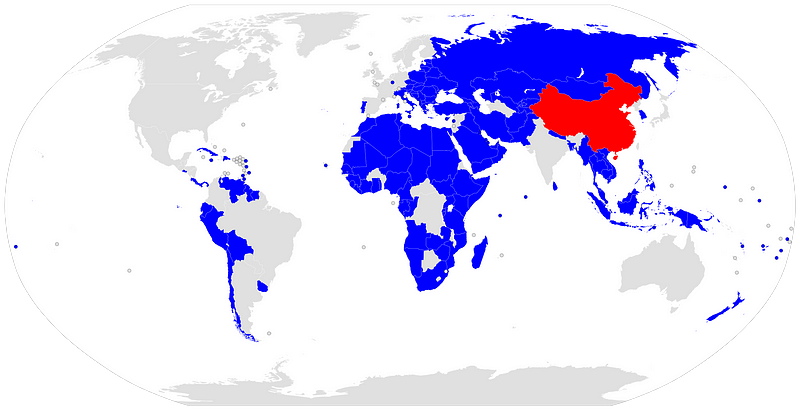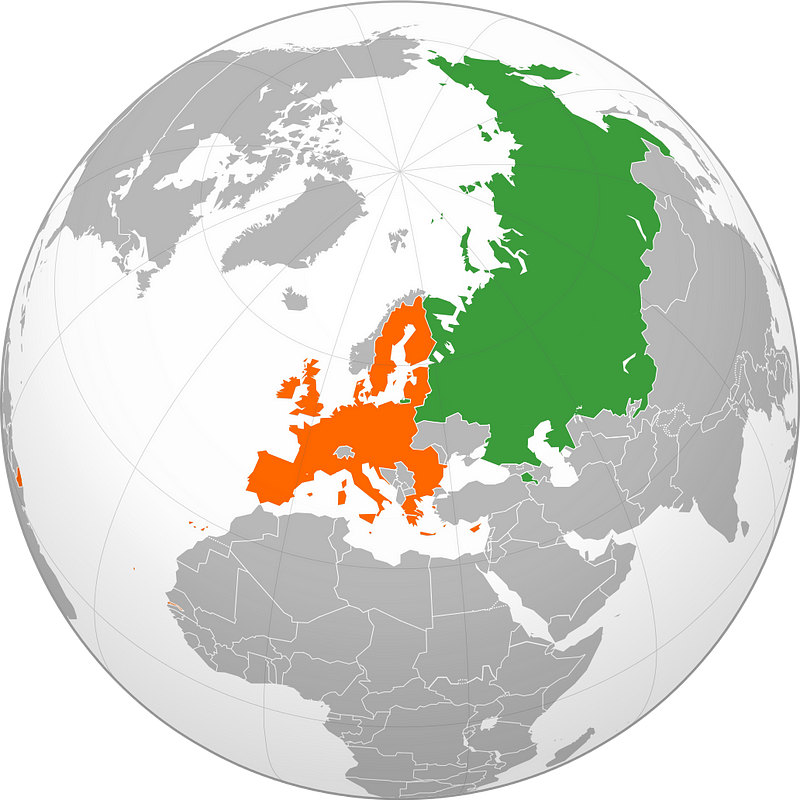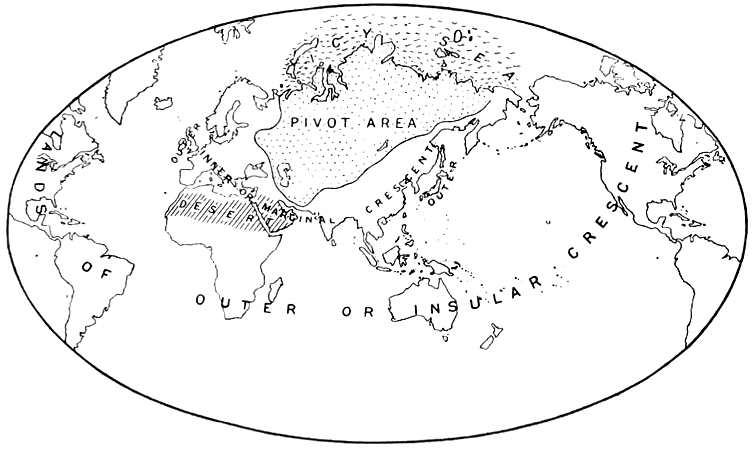Encircling China — A Thought Experiment
China is today the most formidable rising power, one that in the near future will be able to challenge the United States for the role of…
China is today the most formidable rising power, one that in the near future will be able to challenge the United States for the role of global leader. Through a series of actions in the last few years, China has shown itself to not be a good-faith actor in the international arena.
It has unilaterally abrogated its agreement with the United Kingdom to allow local self-rule of Hong Kong until 2049. It has built up its military presence in the South China Sea and claimed sovereignty over that entire body of water. It has continued to act in a menacing way to Taiwan and to underwrite the provocative actions of the North Korean regime. Additionally, it has engaged in a form of predatory capitalism, underwriting large scale public works projects in foreign nations and then seizing the assets as collateral. It has also attempted to criminalize criticism of the Chinese state by foreign nationals outside its borders, stolen intellectual property, and attempted to suppress dissident speech globally.

A nation like this can not be allowed to lead the global order, and it must be appropriately contained until it grudgingly agrees to be a good faith actor. A policy of strategic encirclement and containment, in both the physical and digital spheres, is the best option as it could leverage a growing network of powerful nation-states and supranational entities to reduce Chinese power projection. What follows is a geopolitical grand strategy at a very broad scale, one that assumes containment of China to be the most important strategic issue in American foreign affairs.
Cutting the Belt and Road — Eurasia
Russia will be an important partner. This is a strange sentence given their attempts to interfere in United States elections and in the governments of the former Soviet republics, such as Ukraine. However, given our circumstances, Russia and its growing supranational economic and political union, the Eurasian Economic Union would provide a valuable buffer zone around Chinese influence.
Founded in 2015, the union is an integrated single market modeled on the European Union with designs on political integration longer term. It also functions to promote infrastructure linking the former Soviet nations and their economic centers. The fact the the Union is directly positioned between China and its overland routes to Europe through Central Asia gives it enormous leverage over China’s attempted revival of the Silk Road network. This leverage could prove very useful.
By forming an alliance with the United States, European Union, and EEU, the passage of Chinese goods through friendly territory would be completely restricted. It also brings a solid case for the maintenance of a residual United States military presence in Afghanistan, as it would completely block off overland trade from China to the west, with the exception of a narrow route along the Kirakorum highway through the Himalayas to Pakistan and to Iran.
Even from there, traffic would have to pass through the EEU Caucasus and/or through Turkey. With the increasing ties between Russia and the Shia militias and military forces of Iran, this would be even more treacherous terrain for the Chinese to travel through with a Western-friendly Russia.
Unfortunately, the Biden administration made the decision to completely withdraw all U.S. presence from Afghanistan. The vacuum in Central Asia will be filled by a combination of Rusia, Iran, China, and Pakistan. The U.S. must try to play these different regional powers against each other to create the most ideal outcome.
There is an old concept in geopolitics referred to as “the World Island”, which encompasses the Old World continents of Europe, Asia, and Africa. In this framework, control of the Old World, and the marginalization of the New World, rests on control of the “pivot area” of Central Eurasia. It was argued that a nation that could politically control this area and develop the infrastructure to bring out its full economic potential would essentially be unstoppable.
The core of the EEU rests on this pivot area, and the Chinese can not be allowed to control it. Aligning this pivot area with Western powers, and taking it out of Chinese orbit, would be essential to securing and defending the rules-based international order that we seek to force China into.
Cutting the Belt and Road — String of Pearls
One of China’s major economic allies is Pakistan. Through the narrow Karakorum highway, China has an outlet to the Indian Ocean that gives it sea access to Europe through the Suez Canal and to Africa, where it is investing heavily in infrastructure and workforce development. India, which is ostensibly a signatory of the Belt and Road, has a frayed relationship with China, and its status as the world’s largest democracy makes it a natural ally of the United States and the Western World.
The establishment of a credible naval deterrent in the Indian Ocean would go a long way to control Chinese ambitions, and make it easier to choke of its access to its African market. Only the cooperation of the Egyptians, a long term security ally, would be required to restrict Chinese naval access to Europe. This applies to the Bay of Bengal as well. Forging a stronger relationship between India, ASEAN, and the United States, as well as easing tensions with Pakistan, will be essential to contain Chinese ambitions in the Indian Ocean.
As a form of economic warfare, Chinese ownership of the Asian ports along the Indian Ocean (referred to as its “String of Pearls”) must be pushed back on. These ports are easily convertible to military facilities, and we risk ceding control of this portion of the world to Chinese economic and military interests. The U.S. must find a way to offer financial assistance to countries saddled with this infrastructre in the form of refinancing of existing debt under friendlier terms and funding of new projects. Otherwise, situations like the one Sri Lanka finds itself in will become more common, and draw more countries into China’s orbit.
A New Trans-Pacific Partnership
Perhaps one of the greatest geopolitical disasters of this century was perpetrated in the first 100 days of the Trump administration. The Trans-Pacific Partnership, a comprehensive 12 nation agreement with the goal of created a common market and political ties among the Pacific Rim nations, was a massive step in building a coalition to challenge Chinese expansionism in the South China Sea. And President Donald Trump blew it up with the compulsive stroke of a pen to fulfill a misguided campaign promise. It will be difficult to restart negotiations for the agreement after this vacillation by the United States, but it is not impossible.
One way to do this is by initiating a series of simple bilateral free trade agreements and informal military and intelligence cooperation. The formation of the Quad, consisting of Japan, India, Australia, and the United States, is a good step in this direction. Other nations, fearful of being left out in the cold by Washington, will need some coaxing to turn back away from Beijing’s orbit. Given that Vietnam, South Korea, Taiwan, Malaysia, and New Zealand are already strong democracies with a general Western orientation makes that process easier.
The Biden Administration appears to be making a major push on this issue. Conversations with Japan indicate that Biden is looking to establish an Indo-Pacific Economic Framework. Details are yet to be released, but hopefully it will reach towards some of the goals just outlined.
Rise of Africa
The goal of the United States in Africa should to promote political stability and economic growth, reducing its vulnerability to interference by foreign powers. Another era of colonialism is not in the best interest of the least developed habitable continent. No foreign power should ever again have dominance over an African nation.
Africa represents the world’s largest untapped pool of economic potential. It must be empowered to use this for its own benefit. Currently, China is taking advantage of sub-Saharan Africa’s political dysfunction to establish a new mercantilist policy. These nations have cheap labor and natural resources in abundance, and China is using a combination of Belt-and-Road infrastructure and economic incentives to utilize these resources to its benefit.
Again, the U.S. and the West should offer the same resources on less predatory terms and draw these African nations voluntarily into an economic block. Former European colonial powers such as France and the UK can leverage their influence in their former colonies to help achieve this goal. Ultimately the goal should be a politically free Africa of strong nation states united in a common economic and security sphere to keep predatory powers out.
The Monroe Doctrine
To counter policy interference and economic colonialism that China is engaging in in South America will again require a strategy of human development akin to the one proposed for Africa. The difference is the United States can be much more aggressive and assertive with its influence in the region. This task must be done in concert with Brazil, a rising global power with a comparable population to the United States.
These nations can work together to forge extensive alliances in Latin America. This will require robust investment in Central America and promoting economic unity in that region. It will also require strengthening the trade agreement with the three titans of North America, the US, Canada, and Mexico. Another very important aspect is the stabilization of the Mexican government and helping it fight the drug cartels that are splintering the country.
A South American Union, spearheaded by Colombia, Brazil, and Argentina will help guard against unwarranted influence from outside powers. These three basic political frameworks should be combined into a alliance for the western hemisphere, with trade links between the powers of North America that are stronger then those the United States has with Europe. It is only by historical accident that this is not already the case.
Countering Digital Diplomacy
The “Great Firewall” is a term to describe the control the Chinese government has over web server traffic in and out of the country. This firewall is used to control the activites of Chinese citizens, and, increasingly, export its censorship regime to its own citizens abroad. It is also an important tool for potential cyber warfare activity.
The enforcement of Chinese law outside its jursidiction must not be allowed. So, the firewall needs to work in reverse. Access to western digital networks and resources should be judiciously guarded and only let down when the Chinese meet certain requirements. Those requirements should include not limiting the internet access of its citizens in other jurisdictions and going through normal extradition channels when one of their citizens is accused of a crime.
Chinese internet censorship is an unfortunate fact for its people, but its not for other nations to decide how China regulates the internet within its borders. But it is their responsibility to make sure that China does not override the laws within their jurisdictions. This is just an extension of its policy of utilizing its economic leverage abroad to silence its critics so they do not speak out about things such as the persecution of the Uyghur minority.
This is an instance where the rise of a great power must be carefully managed, and China does not appear to have the leadership with the background to rise to this task. Their politics is driven by historical grievance with a desire to throw off the American-led world order. This is simply based on the actions of the Chinese state, not any sort of paranoia. One only has to look at its veto of democracy in Hong Kong, its increasingly threatening rhetoric towards Taiwan and the United States, and its attempts to turn the South China Sea into its own lake with artificial islands, among other provocations.
Until they begin to behave responsibly, the rest of the world must hold the line and use whatever leverage it has to keep China in line. If left to its own devices, it would introduce a volatile situation where a large-scale global conflict would be inevitable. It hasn’t happened in 70 years, and it must be prevented for as long as possible
Ken Briggs is a Dallas-based entrepreneur, marketer, and writer. Ken grew up in the Dallas area and holds a master’s degree in Mechanical Engineering from Texas A&M University. Currently, he is Chief Marketing Officer of the tech startup Decentralized Web Technologies and is a member of the World Affairs Council of DFW. Business and marketing is his career, writing on current events, foreign policy, and history is his passion. Contact him at kwbriggs610@gmail.com




